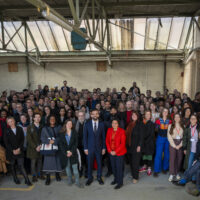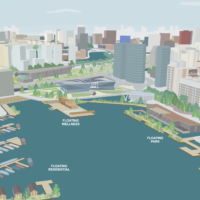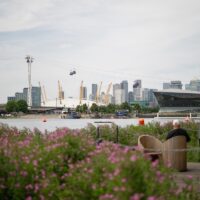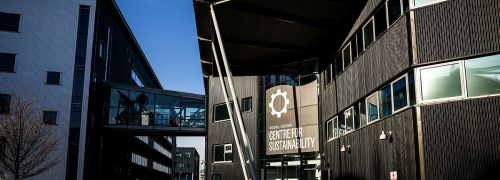
Regeneration news
University of East London unveils Royal Docks Centre for Sustainability
In an historic day for London’s East End, the University of East London (UEL) launched the Royal Docks Centre for Sustainability (RDCS) on Wednesday (6 December), marking the dawn of a new era in innovation and sustainability in the area.
Distinguished guests, including London’s Mayor Sadiq Khan and the Mayor of Newham Rokhsana Fiaz OBE joined UEL’s Vice-Chancellor and President Professor Amanda Broderick at the launch event, to celebrate the inauguration of this pioneering initiative.
London Mayor Sadiq Khan’s keynote speech emphasised the excitement he and the community share at the prospect of what will be achieved by the RDCS – becoming a hub for world-class green research and innovation.
He said, “I believe this institution is best seen as symbolising two of the most profound changes happening in London right now - our shift eastwards and our shift to Net Zero. The RDCS embodies our city's direction of travel.
“City Hall moved here because I believe great things will be done at the Royal Docks. This Centre is now integral to one of the most significant regeneration projects in Britain and will help drive the entire venture forward over the coming decades, delivering good, inclusive growth as well as wellpaid, high-skilled, meaningful jobs for east Londoners.”
I believe this institution is best seen as symbolising two of the most profound changes happening in London right now - our shift eastwards and our shift to Net Zero.
Mayor of London, Sadiq Khan
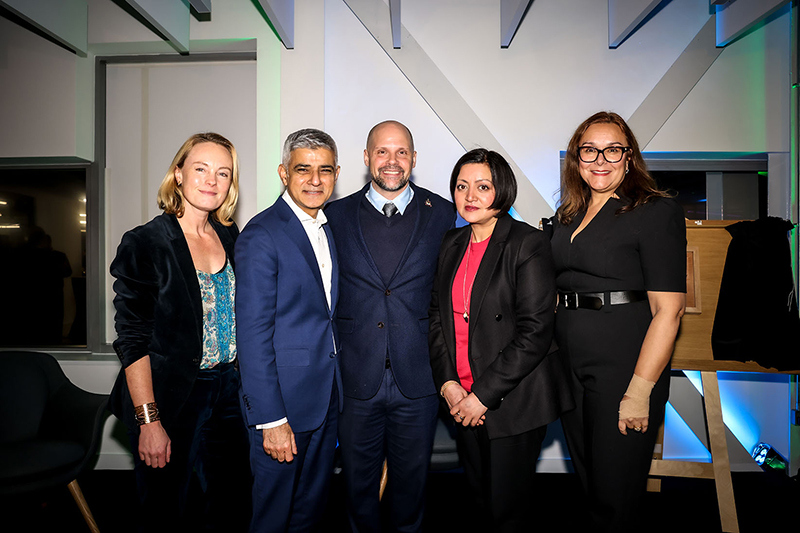
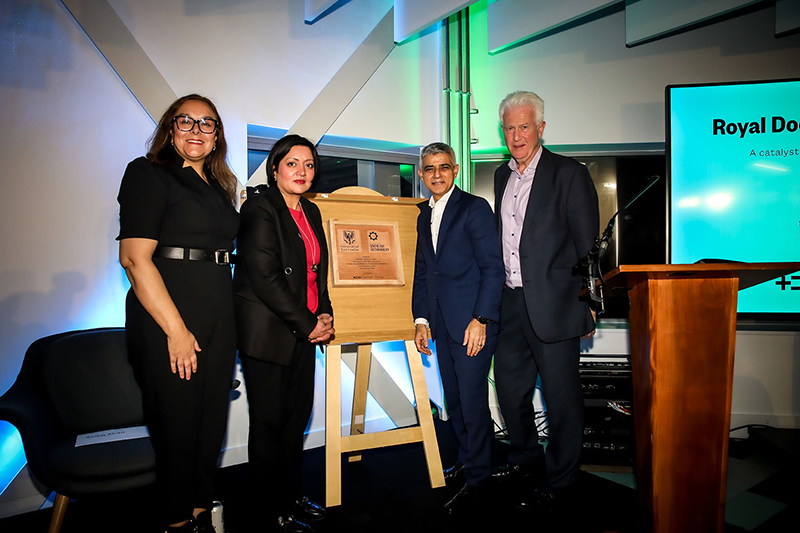
Mayor of Newham, Rokhsana Fiaz OBE, said, “The Royal Docks Centre for Sustainability brings together the entrepreneurial ingredients from across Newham to support the development of future skills while driving needed collaboration between industry, academia and our people. Partnerships and collaboration resulting from the launch of the new Centre will help to implement the Borough’s Just Transition Plan, up-skilling residents and providing opportunities to deliver new solutions that will be essential to adapting to climate change and transitioning towards a green economy.
“This new space allows Newham and broader east London to convene with partners from various sectors to help collectively solve all the interconnected challenges that the climate emergency presents us. While the challenges may be known, the solutions will look different in every sector, in every neighbourhood, so it’s critical to have a centre like this helping solve global challenges in a local way.”
Partially funded by the Royal Docks Enterprise Zone's Good Growth Fund, the RDCS is positioned to become a regional hub for innovation and creativity and forms a part of the University’s bid to become net carbon neutral by 2030.
The Royal Docks Enterprise Zone, London’s largest regeneration area, promises 30,000 new homes, 41,500 jobs, and an £8 billion investment over the next two decades, focusing on community, sustainability, and innovation. The RDCS plays a key role in this ambitious project, bringing together academia, industry and the community, with the aim of becoming a beacon for sustainable living locally and globally.
Situated at the University’s Docklands campus and spanning three floors, the RDCS is a cornerstone of an ambitious multi-million pound investment programme which is creating dynamic, inclusive spaces for learning, working, and living. Central to the University’s visionary 5.0 careers-1st approach, the Centre will be home to a number of world-leading initiatives including UEL’s Living Lab. This ground-breaking initiative in partnership with Siemens, offers students, researchers and local businesses an inclusive place to test, research and adapt technology in a real-world environment. Of particular value to researchers will be the opportunity to experiment on a small-scale, in a secure environment, with the facility to later scale up across east London and beyond.
As well as the Living Lab, the RDCS will host sustainable startups – building on the University’s leading reputation in business incubation and acceleration - encouraging and supporting an ecosystem of new thinking to tackle the threat of climate change. It will also be involved in the Blue Green Corridor, a visionary project which aims to develop the lower reaches of the River Thames by fostering green careers and infrastructure.
Speaking at the RDCS launch event, Professor Broderick spoke of her hopes for the exciting new space: “The Royal Docks Centre for Sustainability is not just a building; it is a vision brought to life. It is a space where researchers, students, alumni, businesses, and local residents converge to create ideas, goals, and ambitions. It breaks down the barriers that often separate academia from its neighbours, offering a space where fresh perspectives and the cross-pollination of ideas flourish.
And recognising that the success of any enterprise rests on the calibre of its workforce, the Centre is poised to supply the region’s businesses with a skilled green workforce ready to tackle the challenges of a rapidly evolving world. Aligned with the objectives of London’s only Enterprise Zone and building on UEL’s lead in business incubation and acceleration, this is a ground-breaking investment into our communities’ growth and development within east London and in our gateway to the world.”
This new space allows Newham and broader east London to convene with partners from various sectors to help collectively solve all the interconnected challenges that the climate emergency presents us.
Mayor of Newham, Rokhsana Fiaz OBE
The launch event, coinciding with the University's Winter Fair on 6 December, featured a panel discussion titled "Sustainable Innovation". Facilitated by Dr Paul Marshall, Pro-Vice-Chancellor (Careers and Enterprise), the Mayor of London and Mayor of Newham; Hannah Pathak, International Managing Director for the sustainability NGO Forum for the Future; and Dr Stephen Diasio, Clinical Professor of Entrepreneurship and Innovation at the University of South Florida, explored the RDCS’s role. The discussion centred on accelerating the pathway to a climate-resilient and sustainable future through enhanced collaboration with industry and community, the development of new skills, and ways to foster enterprise growth within east London and beyond.
Aligned with the UN Sustainable Development Goals, the RDCS will build on UEL’s aims to contribute to community wealth building, address local and global challenges, and create a cleaner, safer world.
The centre invites collaboration with community organisations and businesses to co-design projects that address regional challenges and create innovative sustainable solutions.
As part of UEL's 10-year Vision 2028 strategy, the RDCS is committed to being a launchpad for businesses defining the new economy. Through careers-1st initiatives, the Centre aims to elevate the skills, knowledge, and employability of students and graduates, supplying the local area with a skilled workforce ready for the challenges of industry 5.0.
The launch of RDCS maintains UEL’s position at the forefront of transformative changes in east London and beyond as the University undertakes a journey towards a more sustainable and innovative future.
